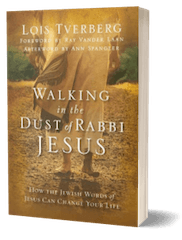 The eye is the lamp of the body. If your eyes are healthy, your whole body will be full of light. But if your eyes are unhealthy, your whole body will be full of darkness. If then the light within you is darkness, how great is that darkness! (Matthew 6:22-23)
The eye is the lamp of the body. If your eyes are healthy, your whole body will be full of light. But if your eyes are unhealthy, your whole body will be full of darkness. If then the light within you is darkness, how great is that darkness! (Matthew 6:22-23)
Over the years, these mysterious words of Jesus have invited all kinds of speculation. But we can crack Jesus’ cryptic saying about the “eye” by hearing it within its Hebraic context, and grasping the figures of speech that Jesus was employing.
Jesus was most likely comparing the idea of having a “good eye” with having a “bad eye,” two idioms that have been a part of the Hebrew language from biblical times until today.1
Having a “good eye” (ayin tovah) is to look out for the needs of others and be generous in giving to the poor. To have a “bad eye” (ayin ra’ah) is to be greedy and self-centered, blind to the needs of those around you.2
You might be surprised at this, but these same idioms appear elsewhere in the Scriptures where they clearly refer to generosity or stinginess. (See Matt 20:15; Proverbs 22:9, 28:22) The subject of money is also prominent in surrounding passages in this sermon.
Why Your “Eye” is Critical
Why is a person’s “eye” toward others so critical to Jesus? Because our relationship with money reveals our relationship with God. To have a “bad eye” is to cling to the little that you have, resenting those with more and refusing to help those with less.
Your attitude shows how convinced you are that God is stingy, that he is either unwilling or unable to care for you. It also reveals how disconnected you are from the struggles of others. No wonder Jesus says that life becomes dark indeed when you’ve cut yourself off from both God and those around you.
On the other hand, if you’re radically convinced of God’s caring presence in your life, you’re also confident that God will provide for your needs. Not just materially, but emotionally and spiritually too.
You may not be wealthy by the world’s standards, but you have a rock-solid understanding that what you have is enough, that ultimately your own situation is secure. The fruit is a generous attitude, a “good eye” toward others. How can your life not brighten when you think this way?
Having a “good eye” or a “bad eye” also points toward a more fundamental issue—what is your primary motivation? Is your driving concern your own comfort in life, or do you look beyond yourself?
Ever more our Christian culture reinforces our self-centeredness, as books and sermons increasingly aim to appeal to our “felt needs.” After a steady diet of self-therapy, however, we simply won’t tolerate a sermon that points out sin or pushes us to care about others. All we want to hear about is, “What’s in it for me?”
Being Frugal or Being Stingy?
This year my car turned twenty years old.3 My favorite clothing boutique is Ditto’s, a second-hand store in town. My sister-in-law has concluded that I’m “pathologically frugal.” With the lean economy in recent years, many others have discovered thriftiness too.
A few years ago, when I was on a tour of Israel, I got a different perspective on frugality. My fellow travelers and I had mentally prepared ourselves to haggle at the markets, ready to bargain down to the last shekel.
Then our guide reminded us that recent years had been terrible for merchants. Political events had kept tourists away, and the streets had been empty for months. Many shops were barely keeping their doors open. For us, a few shekels’ difference was a source of pride at how cheaply we could get a souvenir. For them, the money would feed the family for another day.
We realized t hat sometimes what we call frugality is actually stinginess. Being frugal is when we deny ourselves something in order to save money. But when we deny others what is due them, by underpaying workers or giving miserly tips, or even bargaining excessively, then we are selfishly saving at others’ expense.
hat sometimes what we call frugality is actually stinginess. Being frugal is when we deny ourselves something in order to save money. But when we deny others what is due them, by underpaying workers or giving miserly tips, or even bargaining excessively, then we are selfishly saving at others’ expense.
One friend of mine, a business owner, never uses coupons. He empathizes with store owners because he knows how tough it is to make a living in business nowadays. It’s his way of living with a “good eye.” He realizes that we need to look beyond our pocketbooks to consider others’ needs as well.
What the Torah Taught
Many of us are glad to skip past the Old Testament’s legal codes. Its laws about unclean foods and ritual impurity strike us as strange and distasteful. But these rules likely didn’t surprise the Israelites, because sacrifice and food laws were common among Israel’s neighbors.
What would have shocked Moses’ first listeners were God’s lengthy list of commands for caring for the vulnerable. Loans to the needy were to be without interest, and if they couldn’t be repaid in seven years, they were to be forgiven (Deuteronomy 15:1-3).
 Slaves and even animals were released from labor for one day of the week, making their need for rest equal to their owner’s. If hard times forced a farmer to sell his land, it was to be returned in the year of Jubilee, which took place every fifty years (Leviticus 25:28).4
Slaves and even animals were released from labor for one day of the week, making their need for rest equal to their owner’s. If hard times forced a farmer to sell his land, it was to be returned in the year of Jubilee, which took place every fifty years (Leviticus 25:28).4
In contrast, the gods of Israel’s neighbors were concerned only with sacrifices and ceremonies. They were not terribly moral, and often were fickle and cruel. The God of Israel was unique in tying worship of him with compassion for others.5 When his people began to believe that rituals were all he required, God sent prophets to remind them that justice to the poor was his greatest concern. This was the heart of Jesus’ teaching too!
Today, people wonder what difference it makes that Jesus was Jewish. What about his culture should affect us here and now? The rituals and food laws of Israel were quite similar to those of other nations. The distinctive feature of the Torah was its great concern for society’s vulnerable. When Jesus came along, he emphasized the very same thing!
The more we read Jesus’ words in their Hebraic setting, the more we discover that to follow Jesus as his first Jewish disciples did, we need to learn to have a very “good eye.”
~~~~~
 This is an excerpt based on chapter 5, “Gaining a Good Eye” from my book Walking in the Dust of Rabbi Jesus (Grand Rapids, Zondervan, 2012, p 69-79.)
This is an excerpt based on chapter 5, “Gaining a Good Eye” from my book Walking in the Dust of Rabbi Jesus (Grand Rapids, Zondervan, 2012, p 69-79.)
1 For more on Jesus’ use of “good eye/ bad eye,” see Craig Keener, A Commentary on the Gospel of Matthew (Grand Rapids: Eerdmans, 1999), 232. See also the chapter references in Walking in the Dust.
2 Having an ayin ra’ah, a “bad eye,” a self-centered attitude, should not be confused with “the evil eye” (ayin ha’rah)—a superstition that a person can cast a spell through an envious gaze.
3 The car I drove when I originally wrote this was 22 years old when I sold it to a junkyard. Then I bought a 4-year old car which now is 10 years old. 🙂
4 See the article, A Surprising Insight on the Sabbath Commandment. See also, David L. Baker, Tight Fists or Open Hands: Wealth and Poverty in Old Testament Law (Grand Rapids: Eerdmans, 2009), 307-15.
5 See John Walton, Ancient Israelite Literature in Its Cultural Context (Grand Rapids: Zondervan, 1994) 229-247.

Adam Thomason says
Love your work. It has transformed my life in many ways. As a full-time filmmaker and documentarian, I want to say thank you and would love to bring your teachings to cinematic life for others to fully benefit from them.
Steven Winn says
As a minister for 18 years, I am always humbled by how well you explain passages in the bible that are difficult to understand.
May you be forever blessed.
Ron Furgerson says
Many thanks for your work. I’m reading your Walking in the Dust of Rabbi Jesus and just finished the chapter on good eye/bad eye. Let me just say that it was, for me, eye-opening. It has really given me a heart to be more generous. Blessings to you and your wonderful ministry. <
Christopher D. Pesnell says
Hi, I’m a New Testament Christian and am not a Greek or Aramaic scholar. I believe it would be helpful to learn the Jewish perception of Jesus as the Messiah. I don’t know, because I just found this web site, but I think that my very brief exposure to this ministry, so far, would enhance me to understand the Hebrew perspective and help me to grow as a Christian. Thank you in advance for your help.
Alvin Martino says
Thank you for providing this historical perspective. I’ve read this verse in Matthew several times, but never pulled this meaning from it. I now understand it is sandwiched between verses concerning earthly treasures and serving two masters. Thank you, thank you, thank you!
Ann Kling says
I just read this blog and discovered you through Dr. Brown. What an eye opener. I have always wished i had the understanding that Messianic Jews seem to have of the Word. This book and your others will be a really big help. Thank you for your diligent study and concise way of writing. Bless you.
Marc Chitwood says
Generosity is the key issue regarding Yeshua’s admonition to the assembly at Laodicea. “Behold I stand at the door” (disguised as a poor person) “and knock”. He wished they would be either “cold” or “hot” in their generosity. A drink of cold water or a hot meal. He advised them to buy from Him eyesalve to rub on their darkened eyes. When we minister to the hungry we minister to the Messiah. Beware lest we entertain angels or even the Messiah Himself without knowing it! When we are generous we are rich in YHWH’s eyes. Matthew 23:35; Hebrews 13:2; Revelation 3:18-20. Loved this article!
Crystal Martin says
HALLELUYAH!!
James "Santiago" Kelly says
I want to thank you for this post. I don’t usually leave comments but I wanted to affirm how you have encouraged me. In pointing out the uniqueness of Jewish dogma, you also reinforced the underpinnings of what faith in God is about. Love. Generosity over survival, mercy over judgment, the peace of faith over the turmoil of fear. In a nutshell this validates the authenticity of the good news and its Author. Thanks again!
Valerie says
I recently became aware of who you are by way of an interview I heard with Kristi McLelland- she recommended your books. How God sovereignly ordained me to find this website , through a google search about Kristi’s teaching of the good eye meaning in session 2 of her study Jesus and Women, is beyond me!
Crystal Martin says
YHWH bless and keep you! I found this article through the YouVersion bible app devotional called “Praying for Results”. I’ve been studying some Hebrew this year and it has opened up a whole new world of understanding His word. This article only adds to it’s richness and enlightenment! Thank you! All praises to the Most High YHWH!
Patrick says
Thank you for this confirmation. The first Proverbs reference is incorrect, I think you meant to say 22:9
James A. Thomas says
Yes, thanks Patrick. This typo still needs correcting.
Lois Tverberg says
I fixed it.
Ayin Raah says
Raah, is not the same as Ra’Ha. “Jehovah Raah” – the Lord our Shepherd
TAMADU Adugba says
I’m Tamadu Adugba, a fervent believer of Christ from Nigeria. I’m grateful to have this message preached by you.
Alvine HAANTOBOLO says
Great lesson here
Richard Gay says
Thank you Lois for a well-written and helpful explanation. Last evening in our home group we looked at Mark7: 15-23, dealing with the defilement that comes out of a “(bad) heart”, and noted that at verse 22 the KJV refers to “an evil eye”, which I suspect is a somewhat sloppy translation of “a bad eye”, which Jesus discussed at Mt 6:22-24. Interestingly the NIV is still further from the mark, when it translates the term as “envy”. Thank you for helping us to see that.